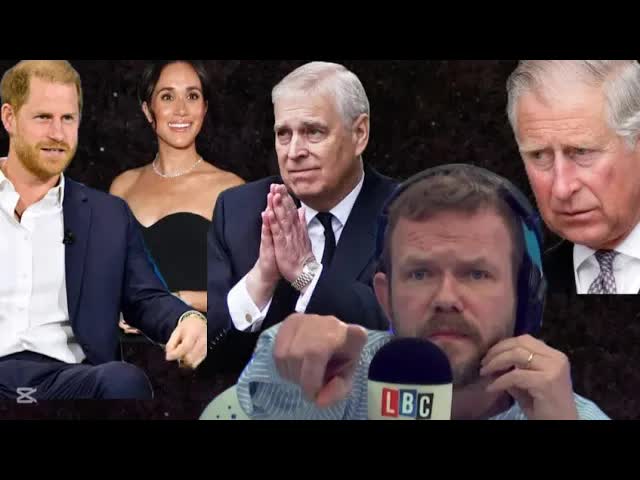In a world where media narratives often dictate public perception, the treatment of Prince Harry and Meghan Markle stands as a glaring example of bias and double standards.
James O’Brien, a prominent voice in talk radio, has recently spoken out about the unjust scrutiny faced by the couple, highlighting the stark contrast between their experiences and those of other royal family members, particularly Prince Andrew.
O’Brien’s commentary resonates deeply with many who have followed the tumultuous journey of the Duke and Duchess of Sussex.
He draws attention to the troubling reality that while Prince Harry has been vilified for standing up for his wife and mental health, Prince Andrew—a man entangled in serious allegations—has seemingly enjoyed a path of rehabilitation within the royal family.
This juxtaposition raises critical questions about fairness and accountability in the media.
Imagine living in a society where two individuals, both under intense scrutiny, are treated so differently.
On one hand, you have Prince Harry, who has chosen to prioritize his family’s well-being and mental health over royal duties.
On the other, there’s Prince Andrew, whose past associations with figures like Jeffrey Epstein have cast a long shadow over his reputation.
Yet, despite these serious implications, it is Harry who endures relentless media attacks.
O’Brien’s assertion that it is astonishing for Harry to be reduced to the same status as his “bread pudding” uncle strikes a chord.
The comparison not only highlights the absurdity of the situation but also underscores the media’s eagerness to vilify Harry while allowing Andrew to slip through the cracks.
It’s as if the tabloids have decided that Harry’s quest for peace is a greater offense than Andrew’s alleged misdeeds.
What makes this situation even more perplexing is the media’s portrayal of Harry and Meghan as threats to the monarchy.
Their desire to carve out a life away from royal expectations, focusing on mental health and philanthropy, has been met with hostility.
Why is it that seeking a peaceful existence has become an act worthy of scorn?
O’Brien challenges us to think critically about these narratives.
He doesn’t merely defend Harry and Meghan; he calls for a broader examination of how public figures are treated based on their actions and the media’s role in shaping those perceptions.
His insights force us to confront uncomfortable truths about bias and sensationalism in journalism.
The media landscape is powerful, often dictating who we champion and who we vilify.
In the case of Prince Harry and Meghan, the press has aggressively painted them as selfish and hypocritical.
Yet, O’Brien argues that they deserve a fair chance to lead their lives without being reduced to caricatures for public entertainment.
When considering the contrasting treatment of Harry and Andrew, one must ask: why the silence surrounding Andrew’s rehabilitation?
The answer lies in the media’s tendency to attack those who challenge the status quo.
Harry’s willingness to speak out and advocate for change puts him in the crosshairs of a press eager to maintain traditional narratives.
O’Brien’s defense of Harry and Meghan extends beyond personal loyalty; it is a call for fairness in judgment.
He emphasizes that every individual should be assessed based on their character and actions rather than their connection to power.
This principle is crucial in a society where public opinion can be swayed by sensational headlines.
As we reflect on O’Brien’s perspective, we are reminded of the importance of empathy and compassion in our discussions about public figures.
It’s easy to get swept up in the drama, but true understanding requires us to consider the full context of a person’s actions.
Can we engage in conversations about Harry and Meghan with respect, even when we disagree?
Ultimately, O’Brien’s insights serve as a reminder that we must strive for a more thoughtful and compassionate approach to public discourse.
In a world rife with division and bias, his call for fairness urges us to challenge existing narratives and consider the complexities of each individual’s story.
As we continue to navigate the landscape of media and public opinion, let’s take a moment to reflect on our own views.
Are we ready to question the narratives presented to us?
Can we foster a more respectful dialogue around figures like Prince Harry and Meghan Markle?
These are the questions that will shape our understanding of fairness in the media and beyond.
